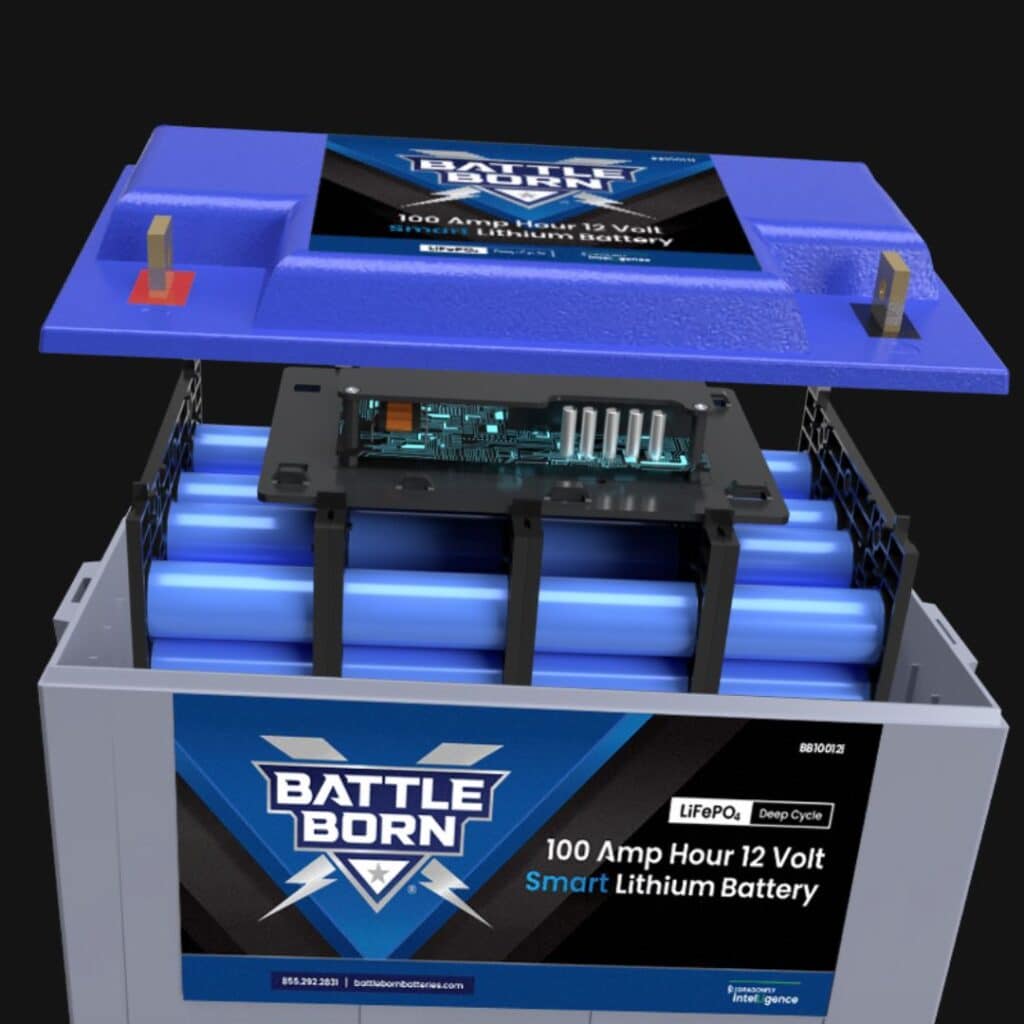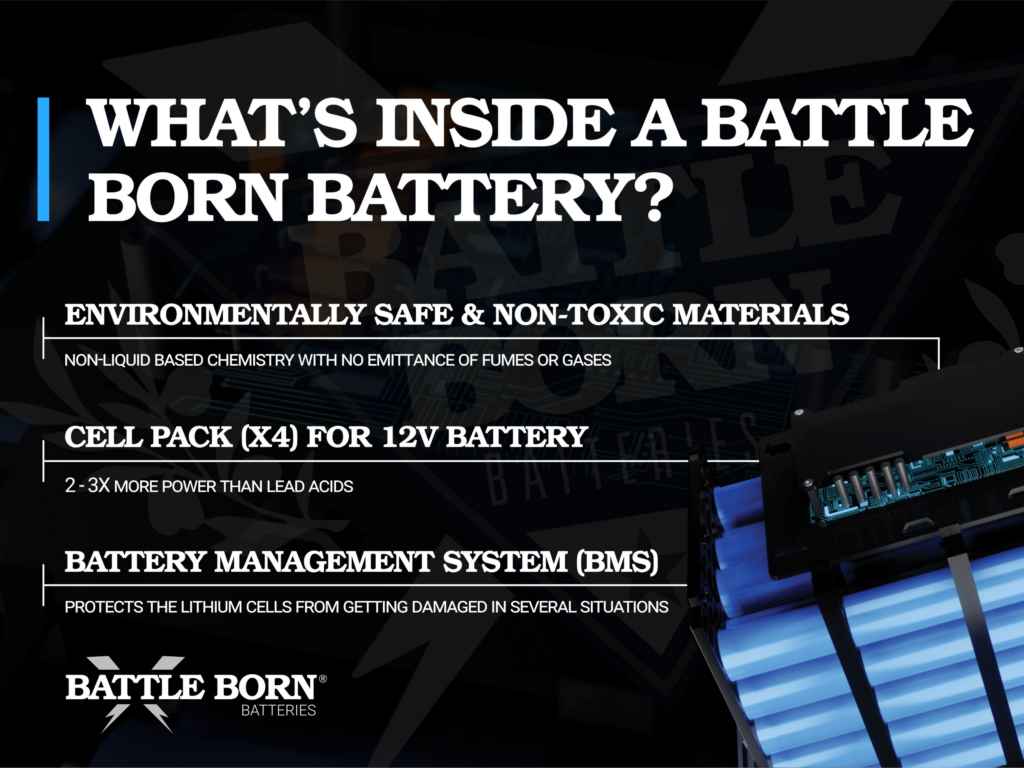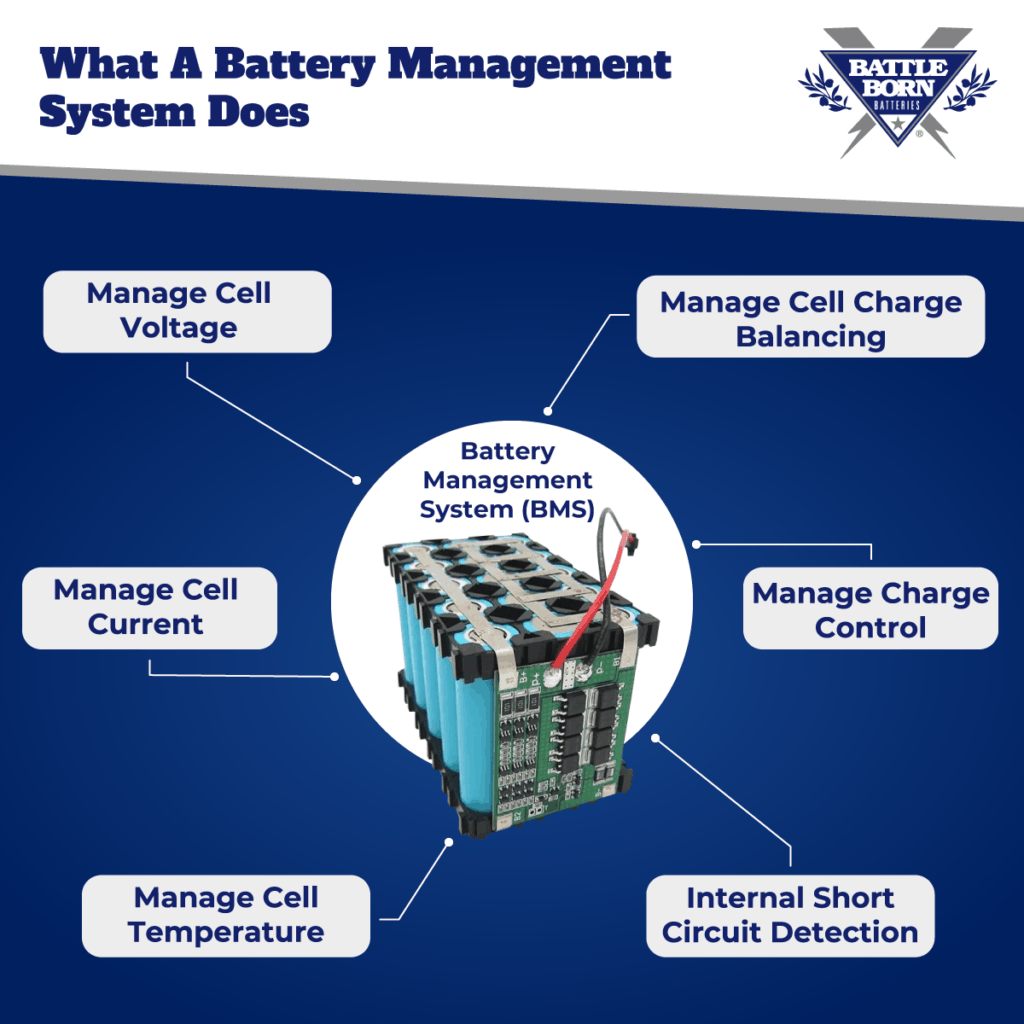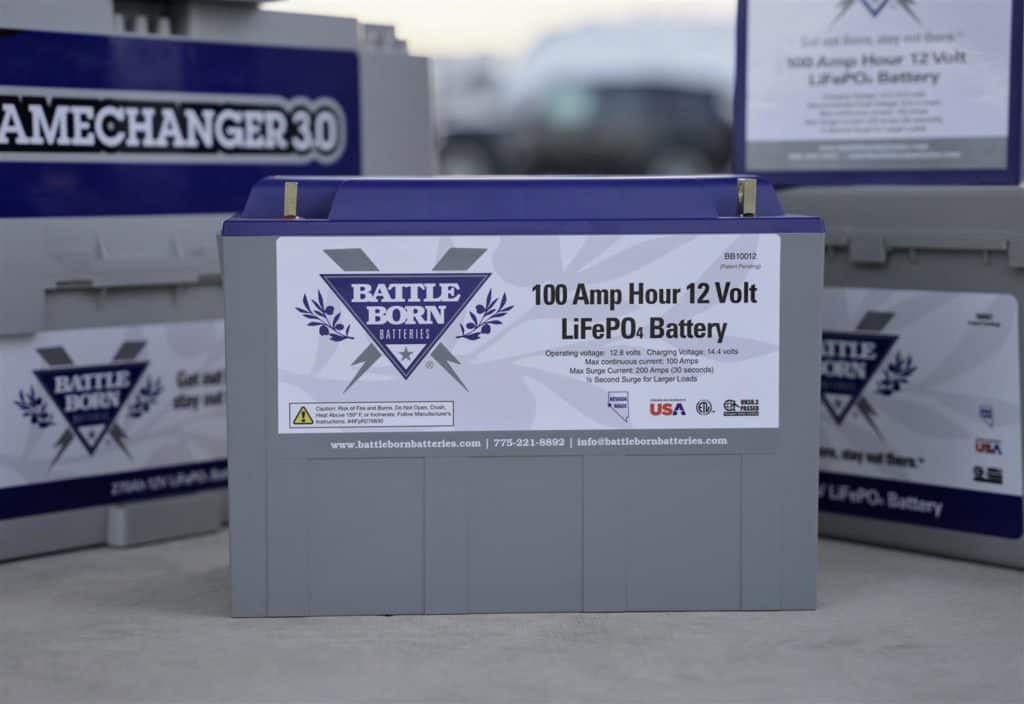
MENUMENU
TALK TO AN EXPERT
Special Hours: 7AM – 6PM PST
TALK TO AN EXPERT
Special Hours: 7AM – 6PM PST
Lithium-ion batteries are lighter, more efficient, and last longer than lead-acid — but they also require protection. Like lead-acid batteries, lithium batteries can be permanently damaged by overcharging, deep discharging, or extreme temperatures.
That’s where the Battery Management System (BMS) comes in. Often called the brain of the battery, the BMS ensures your batteries operate safely, efficiently, and for as long as possible.
In this guide, we’ll cover:

A battery management system (BMS) is an electronic system built into (or added onto) rechargeable batteries that:
Think of it as your battery’s control center. It constantly checks conditions and takes action to prevent damage, keeping your power system safe — and keeping you out on the road, water, or trail longer.
They also help extend the life of lithium-ion deep cycle batteries, which carry higher up-front costs than lead-acid alternatives. From this perspective, a BMS lets you extract more value from the investment you’ve made.
Lithium-ion batteries use a flammable electrolyte. Without a BMS to regulate them, risks like overheating, shorts, and thermal runaway increase dramatically.
A BMS doesn’t just protect the battery — it protects your RV, boat, or off-grid cabin, and most importantly, your family.
⛵️ Related: How a BMS Protects Your Boat
At its core, the BMS prevents the battery from operating outside safe limits. It monitors each individual cell and calculates how much current can safely go in (charging) or come out (discharging). If it detects unsafe conditions, the BMS intervenes — either by regulating power flow or, in extreme cases, shutting the battery down to protect both the system and the user.
That’s why lithium batteries don’t slowly “fade” like lead-acid. Instead, once the BMS detects that the battery has reached the safety threshold, it shuts the battery off completely.

A BMS performs three essential roles: Monitoring, Protection, and Optimization.
The battery management system monitors individual cells in the battery pack. It then calculates how much current can safely go in (charge) and come out (discharge) without damaging the battery.
A BMS constantly measures:
The BMS uses this data to know when the battery is drained and shut the battery down. This is why lithium-ion batteries don’t show signs of dying like a lead-acid, but just shut off.
The current limits prevent the source (usually a battery charger) and the load (such as an inverter) from overdrawing or overcharging the battery.
The BMS prevents your lithium battery’s voltage from going too high (causing overheating and gas release) or too low (leading to permanent damage). Damage occurs if you overcharge (cell voltage gets too high) or over-discharge (cell voltage gets too low) a lithium-ion battery cell.
The safety and stability of lithium-ion battery cells depend on temperature maintenance within certain limits. If the temperature exceeds the critical level on either end, thermal runaway can occur. Consequently, this can lead to an inextinguishable fire.
The BMS monitors the temperature and sometimes controls cooling fans (in the case of an electric vehicle) to help maintain proper conditions. It will even shut down cells if needed to protect the battery.
Internal and external shorts can also lead to thermal runaway. For this reason, protection from shorts is another critical component of a battery management system.
This protects the battery pack from cell voltages getting too high or low, which helps increase the battery’s longevity.
Without a BMS, cell-specific charge levels can shift over time. This creates imbalances that can reduce the battery’s lifespan and capacity. Battle Born’s BMS uses both active and passive optimization systems:
Together, these functions ensure your batteries perform at their best — safely and reliably.

There are two main ways to integrate a BMS into a power system:
Battle Born Batteries feature an advanced internal BMS that continuously monitors each cell and shuts down if unsafe conditions occur. This ensures long-term reliability without extra components or hassle.
For most RV, marine, and off-grid applications, an internal BMS is the safest and most convenient choice. Our team does not recommend purchasing a battery unless it has an internal battery management system.
If you’re running lithium batteries, a BMS isn’t optional — it’s essential. When choosing one, make sure it offers:
While all battery management systems are designed to protect and monitor batteries, not every BMS offers the same level of quality or reliability. A poorly designed or defective BMS can cause more problems than it prevents.
Your BMS is essentially the safety net for your lithium battery. If it doesn’t work properly, the battery chemistry itself can’t protect against dangerous conditions. That’s why choosing a trusted manufacturer with proven engineering and quality testing is critical.

Every Battle Born Battery includes a proprietary, internal BMS designed specifically for our batteries’ LiFePO4 chemistry. Unlike generic alternatives, we optimize our system for:
With Battle Born, you don’t need to buy or install an external BMS. It’s already built in — ready to deliver safe, reliable power from day one.
Our internal battery management system is rated for three different levels:
One hundred (100) amps continuous, or 1,200 watts at 12 volts, can pull all amps out of the battery when you need it until the capacity has been depleted. Our battery management system will not allow a current that exceeds 100 amps for more than 30 seconds and cuts off any surge over 200 amps after half a second.
Please note that when you have two batteries in parallel, the surge levels are doubled.
When it comes to regulating amperage from an alternator, the BMS does not have the capability to do that. If you’re in a situation where you only have one or two batteries, we do not recommend you charge a battery more than 50% of your whole battery bank.
If you only have two batteries in your van, and you’re running a 225-amp alternator, you can potentially pump 225 amps into a battery bank that can’t be charged more than 100 amps. Regulation of those amps must go through a battery-to-battery charger, which we sell from Victron.
It’s important to regulate this current in order to charge the battery properly without shortening the lifespan of your Battle Born Batteries.
Our BMS does not limit the charging current, and our team always recommends a 50 amp charge rate for a 100 amp hour battery. You can charge at a higher charge rate of 100 amps in emergency situations where it’s necessary, but we do not recommend it, especially for long periods of time. With 200 amps for 30 seconds, the device will ensure that it can deliver 2,400 watts for 30 seconds.
In this video, our CEO Denis explains how, in order to preserve your battery and your rig, the internal BMS will prevent a charging current if it experiences a voltage increase above 14.6 volts. It’ll continue to allow discharging and it doesn’t happen right away at 14.6 volts. The BMS measures the voltage of each individual cell and if the highest cell exceeds the threshold voltage, it will prevent charging.
We’d like to note that sometimes this process can occur at 15 volts or as low as 14.4 volts.
If the battery cells are imbalanced, they can be rebalanced again. If you happen to see the battery cuts off charging below 14.4 volts, that’s just an indication of a minor imbalance. The battery is still functional and it’s no cause for concern. If the battery spikes to 15 volts, then the level of imbalance is very high. Our team stresses the importance of aiming for that sweet spot of 14.2–14.6 charging voltage because those numbers are guaranteed to avoid high voltage disconnect.
High voltage disconnect happens when a cell experiences a high amount of voltage. The battery will prevent a charging current from happening. Cells can no longer charge, and excess voltage puts them out of operational specs.
The BMS, when in high voltage disconnect mode, cannot disconnect from the system. Even though the battery won’t take a charge current, it will always allow a discharge current. As soon as you try to draw a current out of the battery in high voltage disconnect, it will allow that current to power your load.
The battery will disconnect during a moment of high current in the system and try to re-establish connection again after 5 seconds. It lets the user know that it’s approaching the threshold that is specially designed for.
If this happens often, our team suggests looking into expanding your battery bank’s capability. Our batteries also have a half–second threshold to allow for a crank of an engine or generator. If this happens, our batteries will disconnect and restart to protect you and the rest of your system. These high current events are not short circuits. The batteries will disconnect, but not reconnect after 5 seconds if they were to experience a short circuit.
Please note that if you have our batteries in your system and a 4 kilowatt or greater inverter, you will need a Current Surge Limiter. The soft–start avoids the high-current shutoff inherent to the internal BMS.
Our batteries do not shut down with 20% remaining. You are able to discharge them down to 0%. Our batteries can be continually discharged to 0% and there is no long-term effect. You can expect to easily get 3000 – 5000 cycles at this depth of discharge.
A battery management system is the unsung hero of modern lithium power. By monitoring, protecting, and optimizing your batteries, the BMS ensures you get the most out of your investment — safely and efficiently.
With Battle Born’s built-in BMS, you get peace of mind, longer-lasting power, and the confidence to get out there and stay out there.
👉 Ready to upgrade your RV, boat, or off-grid setup with safe, reliable lithium power?
Shop Battle Born Batteries today or call our Nevada-based team at (855) 292-2831.
We know that building or upgrading an electrical system can be overwhelming, so we’re here to help. Our Reno, Nevada-based sales and customer service team is standing by at (855) 292-2831 to take your questions!
Also, join us on Facebook, Instagram, and YouTube to learn more about how lithium battery systems can power your lifestyle, see how others have built their systems, and gain the confidence to get out there and stay out there.
We know that building or upgrading an electrical system can be overwhelming, so we’re here to help. Our Reno, Nevada-based sales and customer service team is standing by at (855) 292-2831 to take your questions!
Also, join us on Facebook, Instagram, and YouTube to learn more about how lithium battery systems can power your lifestyle, see how others have built their systems, and gain the confidence to get out there and stay out there.
Shop Best Sellers








Ask a technical specialist now at 855.292.2831
Stay in the Know
10 thoughts on “What Is A BMS (Battery Management System)?”
With LiFePO4 battery packs based on “cylindrical cells (e.g. 26650 type cells that look like a flashlight D-cell)”, I often see the recurring comment “The battery management system monitors individual cells in the battery pack.”
Isn’t it more the case that Battle Born and others wire ~30 26650 “cells” in parallel to form a bank, and then wire 4 banks in series to complete the battery pack? And while there are 120 26650 “cells” in the battery pack, the BMS only monitors and balances the 4 banks (of 30 cells each)?
I wonder if some of the misleading terminology comes from LiFePO4 batteries based on “prismatic cells” (the cells look like a brick or cigar box) where only 4 prismatic cells are required to complete a battery pack, and the BMS only monitors those 4 prismatic cells (banks).
The two 100Ah Battle Borns in my camper have been awesome, and I thank Battle Born once again for the phone support when I installed them last year.
Good day
How can I place an order for lithium batteries for solar system
Hello! Please give our team a call at 855-292-2831 or check out our online store here: https://battlebornbatteries.com/product-category/all-batteries/lifepo4-batteries/
Are your BMS systems for lithium batteries EMP protected?
Hi Richard, thank you for reaching out. In extreme situations, the BMS does not rely on electricity to solely function, and we have not tested for scenarios like this. If you have any additional questions please feel free to give our technical sales team a call at 855-292-2831.
1) How can the Internal Circuitry for the Battery Management System (“BMS”) be tested in the Field?
2) How can Customer determine if the BMS is operational and in safe condition in any particular Battle Born LiFePo(4) Battery?
3) If two (2) Battle Born LiFePo(4) Batteries of the same type (with BMS) are installed in parallel, will/could the individual BMS internal circuit systems interfere with each other? (e.g. provide a “false-fault” )?
4) If one BMS is malfunctioning in one Battle Born LiFePo(4) Battery, will it affect the BMS in the other?
5) If any/either BMS is malfunctioning, will it affect the operation of any Charging/Inverter system?
Once the BMS shuts the battery down, is there a way to reset it?
Hi Gary! If the BMS on your battery has shut it down, we recommend jumping it with another 12V source. Just connect your Battle Born battery to a starting battery from a boat or car, and jump like you would a car battery, leaving them connected for a few minutes and up to an hour. This should wake up the Battle Born Battery, and if you have a voltmeter, you should be able to read a voltage above 10V coming from the battery. Then you can charge it normally.
Hi. I have 4 BB 100 amp batteries I want to install in my motorhome. I have a diode battery isolator built in which of course does not sense voltage from the alternator. I assume the BMS will not allow charging if it is full. Is that correct? My next assumption is if the BMS shuts of charging it will not allow current to flow to the house 12Volt electrical system. Or will the BMS allow outflow of current from the batteries to the devices?
Thank you
Hi Richard. When connecting your alternator to charge your house bank, we recommend using a DC-to-DC charger in between to help protect your alternator.